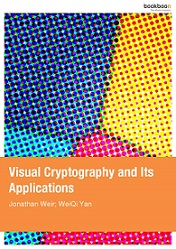
|
FreeComputerBooks.com
Links to Free Computer, Mathematics, Technical Books all over the World
|
|
- Title: Visual Cryptography and Its Applications
- Author(s) Jonathan Weir, WeiQi Yan
- Publisher: BoBoCoAe (2015); eBook (Online Editions)
- Hardcover: 163 pages
- eBook: PDF
- Language: English
- ISBN-10: 8740301265
- ISBN-13: 9788740301267
- Share This:

|
In this book, one of these data security methods known as Visual Cryptography (VC) is presented. Specifically, visual cryptography allows effective and efficient secret sharing between a number of trusted parties. As with many cryptographic schemes, trust is the most difficult part. Visual cryptography provides a very powerful technique by which one secret can be distributed into two or more shares. When the shares are xeroxed onto transparencies and then superimposed exactly together, the original secret can be discovered without computer participation.
About the Authors- N/A
- Cryptography, Cryptology, and Cryptanalysis
- Digital and Computer Forensics, Forensic Science, etc.
- Computer and Information Security

- Visual Cryptography and Its Applications (Jonathan Weir, et al)
- The Mirror Site (1) - PDF, ePub, etc.
-
 Handbook of Applied Cryptography (Alfred J. Menezes, et al)
Handbook of Applied Cryptography (Alfred J. Menezes, et al)
This book is an incredible achievement. If you want to check what problems there were with a proposed system, determine how the variations on a particular algorithm developed, see what research preceded and followed an idea, go to the Handbook.
-
 Modern Cryptography Volume 1: A Classical Introduction
Modern Cryptography Volume 1: A Classical Introduction
This book systematically explores the statistical characteristics of cryptographic systems, the computational complexity theory of cryptographic algorithms and the mathematical principles behind various encryption and decryption algorithms.
-
 Modern Cryptography Volume 2: Post-Quantum Cryptography
Modern Cryptography Volume 2: Post-Quantum Cryptography
This open access book covers the most cutting-edge and hot research topics and fields of post-quantum cryptography. The main purpose of this book is to focus on the computational complexity theory of lattice ciphers.
-
 Practical Cryptography for Developers (Svetlin Nakov)
Practical Cryptography for Developers (Svetlin Nakov)
A modern practical book about cryptography for developers with code examples, covering core concepts, along with crypto libraries and developer tools, with a lots of code examples in Python and other languages.
-
 The Joy of Cryptography (Mike Rosulek)
The Joy of Cryptography (Mike Rosulek)
The definitive introduction to all major areas of cryptography: message security, key negotiation, and key management, but in a way that is more accessible than what is "traditional" in crypto. All security definitions are written in a "game-based" style.
-
 Cryptography: An Introduction, 3rd Edition (Nigel Smart)
Cryptography: An Introduction, 3rd Edition (Nigel Smart)
This book provides the rigorous detail required for advanced cryptographic studies, yet approaches the subject matter in an accessible style in order to gently guide new students through difficult mathematical topics.
-
 A Graduate Course in Applied Cryptography (Dan Boneh, et al)
A Graduate Course in Applied Cryptography (Dan Boneh, et al)
This book is about mathematical modeling and proofs to show that a particular cryptosystem satisfies the security properties attributed to it: constructing practical cryptosystems for which we can argue security under plausible assumptions.
-
 Fundamentals of Cryptology: A Professional Reference (H. Tilborg)
Fundamentals of Cryptology: A Professional Reference (H. Tilborg)
This is a thoroughly written wonderful book on cryptography! This excellent book is warmly recommended for mathematicians, computer scientists, for professors and students, and, as a reference book, for researchers in the area of cryptography.
-
 Introduction to Modern Cryptography (Mihir Bellare, et al.)
Introduction to Modern Cryptography (Mihir Bellare, et al.)
This book introduces the core principles of modern cryptography, with an emphasis on formal definitions, clear assumptions, and rigorous proofs of security. It also presents design principles for widely used stream ciphers and block ciphers.
-
 Cracking Codes with Python: Building and Breaking Ciphers
Cracking Codes with Python: Building and Breaking Ciphers
Learn how to program in Python while making and breaking ciphers - algorithms used to create and send secret messages! You'll begin with simple programs for the reverse and Caesar ciphers and then work your way up to public key cryptography, etc.
-
 Open Workbook of Cryptology: Python Projects
Open Workbook of Cryptology: Python Projects
This book uses Python and some standard cryptographic libraries in Python to explore these cryptological ideas. It should be accessible to students with a solid basic comfort level with Python – but could also be used as a way to solidify Python.
-
 The Laws Of Cryptography With Java Code (Neal R. Wagner, et al.)
The Laws Of Cryptography With Java Code (Neal R. Wagner, et al.)
This book is for Java developers who want to use cryptography in their applications or to understand how cryptography is being used in Java applications. Knowledge of the Java language is necessary, but you need not be familiar with any of the APIs discussed.
-
 Cryptography and Computer Security (Chris Bourke, et al)
Cryptography and Computer Security (Chris Bourke, et al)
This book introduces the basic concepts in computer networks and the latest trends and technologies in cryptography and network security. The book is a definitive guide to the principles and techniques of cryptography and network security.
-
 Theory and Practice of Cryptography & Network Security Protocols
Theory and Practice of Cryptography & Network Security Protocols
This book discusses some of the critical challenges that are being faced by the current computing world and also describes some mechanisms to defend against these challenges. It is a valuable source of knowledge for researchers and engineers.
-
 Cryptography and Security in Computing (Jaydip Sen)
Cryptography and Security in Computing (Jaydip Sen)
The purpose of this book is to present some of the critical security challenges in today's computing world and to discuss mechanisms for defending against those attacks by using classical and modern approaches of cryptography mechanisms.





